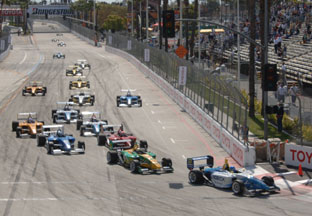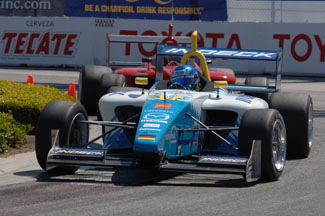The Way It Is/ There are many messages from Champ Car's booming new Atlantic formula
by Gordon Kirbyillustrated by Paul Webb
 Here we are in the merry month of May, hand-wringing time for ten unfortunate years about the state of the Indy 500 and American open-wheel racing. Ten years after the CART/IRL split it's clear to all that reunification is the best, the healthiest, and the only real way forward, but as everyone knows and as I've already documented in this column, powerful personalities remain opposed to a path of progress ahead of their own interests.
Here we are in the merry month of May, hand-wringing time for ten unfortunate years about the state of the Indy 500 and American open-wheel racing. Ten years after the CART/IRL split it's clear to all that reunification is the best, the healthiest, and the only real way forward, but as everyone knows and as I've already documented in this column, powerful personalities remain opposed to a path of progress ahead of their own interests.
I'm encouraged only because Kevin Kalkhoven and Jerry Forsythe are being uncommonly positive. Forsythe is a veteran of the CART/IRL war, deeply familiar with the situation, and I've never heard him so confident that something might happen this time. "I'm optimistic," Forsythe said last week. "This is the first time they [Tony George and the IRL] have been willing to sit down and have a serious discussion. I think we'll know where we're going in three or four weeks."
Meanwhile, the IRL teams are starting practice at Indianapolis this week and Champ Car runs a new street race in Houston this weekend, then goes down to the Monterrey, Mexico road course the following weekend. While both series struggle along, the good news on the American open-wheel scene is all about Champ Car's revitalized Atlantic series. The key ingredients are a new chassis from Swift in San Clemente, a new engine from Mazda/Cosworth that is cheaper and more powerful than the old Toyota engine, and a $2 million prize for the series champion dedicated to landing him a Champ Car ride.

All these things resulted in a refreshingly full field at the Long Beach season-opener of twenty-nine cars, all but three or four of them seriously competitive. It was great to see and enjoy a deeply competitive field of talented, ambitious young drivers from around the world.
Twelve nations were represented by the twenty-nine Atlantic drivers at Long Beach and the season-opener was won by 21-year old German Andreas Wirth from Brazilian Raphael Matos, 24, and Canadian James Hinchcliffe, 19. Graham Rahal, 17, was the top American finisher in fifth place behind Frenchman Simon Pagenaud who will celebrate his 22nd birthday on May 18. And too, there was a strong crop of Americans, including Jonathan Bomarito, who was in the top three before running out of fuel, Robbie Pecorari, Leo Maia, Alan Sciuto, Joe D'Agostino and Al Unser III.
Young Rahal's dad Bobby was there, as he will be at most of Graham's races this year, and the three-time CART champion and IRL team owner put the best perspective on the excitement and enthusiasm surrounding the reborn Atlantic series. "If Atlantic is the future of Champ Car, then Champ Car's in pretty good shape," said Rahal to many people during the Long Beach weekend.

It's interesting in fact, that as much as we berate our own ladder system, it looks good to drivers from elsewhere. I referred to the discombobulated European ladder system last week where Formula 3000/Formula 2, Formula 3, and FF1600 have been replaced or reduced by a plethora of manufacturer-backed spec-car formulae resulting in so many categories and championships that nobody knows who's who or what's what. Yet here in this country the same manufacturer-driven world seems to have been a boon. Thanks to the long-established Skip Barber system, allied to the recently-arrived Formula Dodge series, Star Mazda series and Formula BMW USA series, the American system looks healthier than it's European cousin!
Another point is that one of the the big motivators over the past twenty years for many drivers going Champ car racing has been the increasingly exclusionary nature of Formula 1. Fewer seats are available in modern F1 compared to days past and some of those drives are a waste of time for any serious young driver. There's also the infernally obtuse politics and power-broking of F1 which keeps a superb driver like Sebastien Bourdais out of F1 and spurns excellent drivers like Cristiano da Matta and Justin Wilson. Champ Car is the beneficiary of F1's sometimes bizarre culture because it remains the only real option to F1, if not quite the same as in CART's heyday.
This year's Long Beach Atlantic winner Andreas Wirth says he decided three years ago when he was just eighteen that he wanted to try racing in the USA. "The reason why I came to the United States was Champ Car," Wirth explained. "It was actually a strange deal. Nothing was planned. I tried to do German Formula 3 after my German Formula BMW series. Then I met an Austrian team owner who told me he wanted to go to the United States and set up a Formula BMW team. And I said, that's cool.
"Actually, I started thinking about Champ Car after my second season in open-wheel cars. When you see how much politics and stuff goes on in Europe, there is no way to get to Formula 1. You could be the best German driver, but if the second-best German has better sponsors and connections then the second-best comes to the highest level. It's not fair. It's not good for drivers' heads.
"So I started telling my dad I wanted to go to Champ Car. I thought it was so cool. And then BMW introduced their championship to the United States and I knew these guys who were going to come over here to race, and I won the championship.
"We had some races with Champ Car and I found some contacts and met some people, like the Forsythe guys. Then I won the championship and had my first Champ car test. If someone had told me that I would test a Champ car before the season started I would have never believed it. But I had my Champ car test and the next good step was the Atlantic series."
Wirth raced in last year's Toyota/Atlantic series and was battling for the championship when he was involved in a multi-car accident at Road America in August. The accident left him with two broken vertebra but Wirth vigorously attacked his rehab program and was driving again three months later. This year, he's driving for Forsythe Racing's new, four-car Atlantic superteam, and marked himself as the early championship favorite with a flag-to-flag win from pole at Long Beach.
Highly-rated Brazilian Raphael Matos finished a close second to Wirth in Long Beach. Matos won last year's Star Mazda championship and drives this year for the top-rated Sierra Sierra team. Like most of today's racers, Matos started racing in karts when he was a kid. He raced karts seven or eight years, then started racing cars. In 2001, when he was twenty, Matos won Brazil's Chevrolet Formula Junior championship.
"I was supposed to race in F3 in Brazil in 2002, but I didn't have the budget for the South American championship," Matos explained. "So my option was to go to Europe or come to the United States and I had some connections here in the U.S. with some Skip Barber people. I had a good chance here, so I came here and ran the Barber series. That's how everything started."
Right away he caught people's attention, finishing second in the entry-level Skip Barber Midwest series and winning the Formula Dodge national run-off. In 2003, Matos won the Formula Dodge national championship series. His prize was supposed to be a ride in the '04 Barber Dodge pro series, but the series came to an end amid CART's bankruptcy and the Barber organization was good enough to bankroll a season for Matos in the Star Mazda series.
Matos finished seventh in his first year in the Star Mazda series, then won the championship in his second year in convincing style. Now he's one of the favorites to win this year's Atlantic championship and Matos couldn't be happier to have chosen American racing and Champ Car as his goal over Europe and Formula 1.
"My goal for sure is Champ Car," he declared. "I love racing in the United States. In my opinion, Champ cars are real race cars. It's real racing. I think I'm kind of old school. I like a sequential box. I don't like paddle shifters. I don't like so many electronics in the car and I think that Champ Car has been able to keep control of the technology so it's more about the driver than the car, and I think that's very important for racing. I like racing hard and, you know, I think F1 is too much about electronics right now."
I couldn't agree more and am always pleased to hear a young racer talking about the sport in this way. In all, Matos is as delighted as Wirth with his decision to pursue his career here in the USA.
"This series is looking healthier now and the United States is where I want to be," Matos said. "I love living here. All my network connections are here and everything that I have today is because I came to the United States and raced here. I'm not sure that if I had gone to Europe that I would have been successful there because they don't have the type of ladder series that there is here in the United States. So for sure, I made the right decision, and I'm planning to stay in the United States and race Champ cars.
"Of course," Matos added, "if I had a chance to go to F1, I would never say no. In the end, I think F1 is the ultimate goal for a driver but I have Champ Car in my mind. That's what I'm working for."
It's refreshing to hear these things from young drivers from both Europe and South America. Because of these factors and its brace of healthy street races Champ Car does have a future without the Indy 500. The fact is these kids don't really care about Indy. They've grown up in a time when the Indy 500 has been damaged goods rather than the great race of old, and they're also road racers who know the IRL and ovals are dangerous. Instead, they see Champ Car as a great and in some ways preferred option to F1.
Rahal may be right that the reborn Mazda Atlantic series is a precursor to a brighter future for Champ Car. Meantime, the new formula has created some great open-wheel racing for all of us to enjoy and be proud of. And as Forsythe added: "What we've got to do is make sure the same thing that's happening in Atlantic will happen next year in Champ Car."
Auto Racing ~ Gordon Kirby
Copyright 2006 ~ All Rights Reserved
Copyright 2006 ~ All Rights Reserved
Top of Page